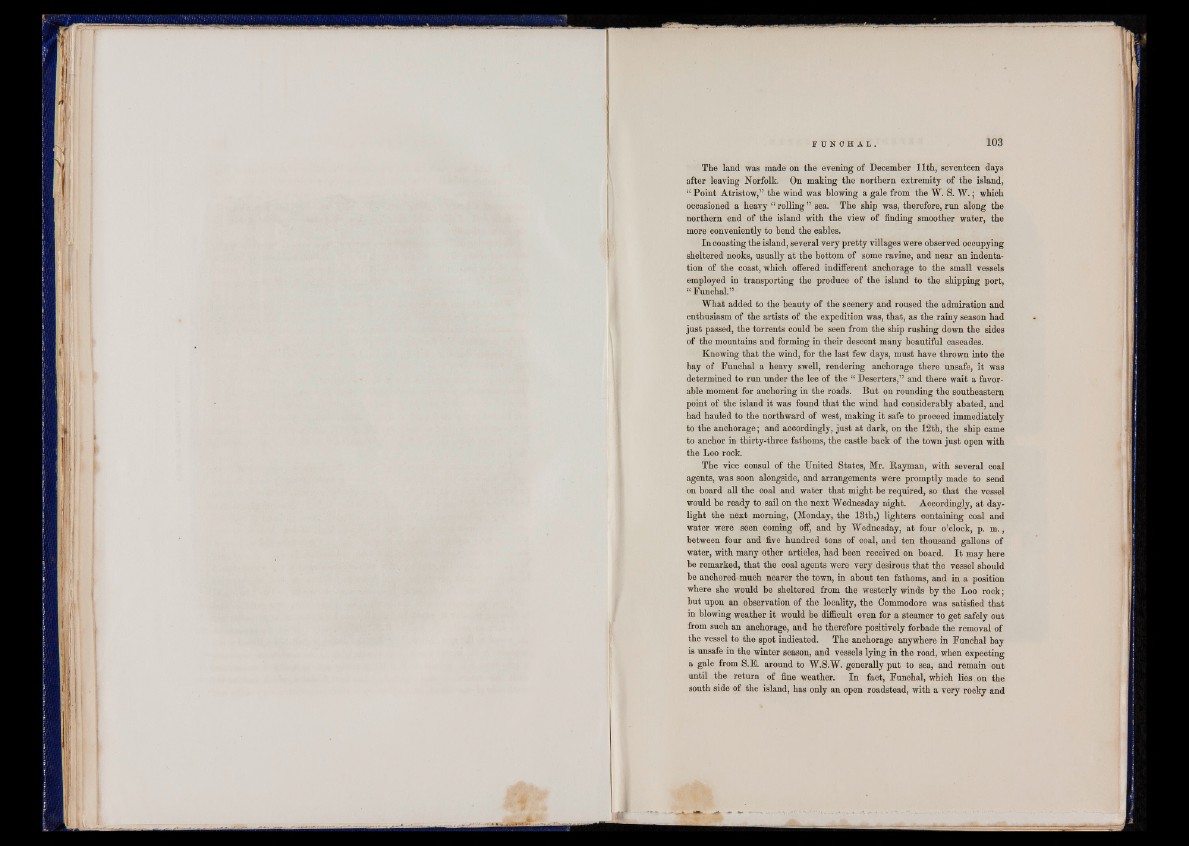
The land was made on the evening of December 11th, seventeen days
after leaving Norfolk. On making the northern extremity of the island,
“ Point Atristow,” the wind was blowing a gale from the W. S. W.; which
occasioned a heavy “ rolling ” sea. The ship was, therefore, run along the
northern end of the island with the view of finding smoother water, the
more conveniently to bend the cables.
In coasting the island, several very pretty villages were observed occupying
sheltered nooks, usually at the bottom of some ravine, and near an indentation
of the coast, which offered indifferent anchorage to the small vessels
employed in transporting the produce of the island to the shipping port,
“ Funchal.”
What added to the beauty of the scenery and roused the admiration and
enthusiasm of the artists of the expedition was, that, as the rainy season had
just passed, the torrents could be seen from the ship rushing down the sides
of the mountains and forming in their descent many beautiful cascades.
Knowing that the wind, for the last few days, must have thrown into the
bay of Funchal a heavy swell, rendering anchorage there unsafe, it was
determined to run under the lee of the “ Deserters,” and there wait a favorable
moment for anchoring in the roads. But on rounding the southeastern
point of the island it was found that the wind had considerably abated, and
had hauled to the northward of west, making it safe to proceed immediately
to the anchorage; and accordingly, just at dark, on the 12th, the ship came
to anchor in thirty-three fathoms, the castle back of the town just open with
the Loo rock.
The vice consul of the United States, Mr. Bayman, with several coal
agents, was soon alongside, and arrangements were promptly made to send
on board all the coal and water that might be required, so that the vessel
would be ready to sail on the next Wednesday night. Accordingly, at daylight
the next morning, (Monday, the 13th,) lighters containing coal and
water were seen coming off, and by Wednesday, at four o’clock, p. m.,
between four and five hundred tons of coal, and ten thousand gallons of
water, with many other articles, had been received on board. I t may here
be remarked, that the coal agents were very desirous that the vessel should
be anchored much nearer the town, in about ten fathoms, and in a position
where she would be sheltered from the westerly winds by the Loo rock;
but upon an observation of the locality, the Commodore was satisfied that
in blowing weather it would be difficult even for a steamer to get safely out
from such an anchorage, and he therefore positively forbade the removal of
the vessel to the spot indicated. The anchorage anywhere in Funchal bay
is unsafe in the winter season, and vessels lying in the road, when expecting
a gale from S.E. around to W.S.W. generally put to sea, and remain out
until the return of fine weather. In fact, Funchal, which lies on the
south side of the island, has only an open roadstead, with a very rocky and